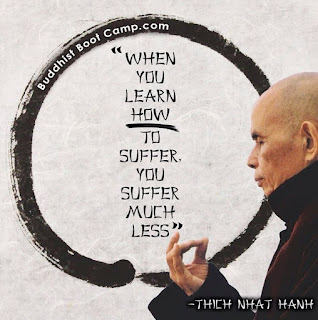Buddhism 101: The Four Noble Truths - Truth 1
An Introduction to This Addition
I'm a Buddhist. I'm not a monk. I'm not an "expert." I'm just me on a path seeking knowledge and enlightenment. To that end, I've decided to keep this blog going, but instead of just focusing on my weight loss, I decided to sneak in other tidbits here and there.Like Buddhism.
I'm not trying to convert anyone (Buddhists don't do that). I'm not trying to convince anyone (or myself) that this is the best and most wonderfullest way to approach faith. I am being a student and using this time to share what I'm learning as I learn it.
I tend to learn a subject better when I'm teaching it.
If this interests you, wonderful! I'd enjoy the company on this journey. If I get something wrong, let me know. I'm learning. I'll probably trip and fall along the way. If you could care less, then go ahead and skip these posts and get back to the weight loss stuff. And if you hate it and want to try to cast out whatever demon is not permitting me to be Christian, have fun with that... and read your New Testament a little more closely. Jesus didn't hate. He just walked around with his hippy 'do and sandals giving out free medical care, food, and love, dude.
The Four Noble Truths (Truth #1): The Truth of Suffering (Dukkha)
When I first read this, I "got" it immediately. Not because I'm a special snowflake who is godmoding life, but because it really spoke to me. Life is suffering. When you have a baby, you suffer (childbirth, anyone?). When you fall in love, you suffer (a loss of independence, changes to your routine, fear of losing that person). When you break your phone, you definitely suffer.This isn't to say that you can never be happy. It's just to say that you can never expect life to be easy or perfect or carefree all of the time.Now this, bhikkhus, is the noble truth of suffering: birth is suffering, aging is suffering, illness is suffering, death is suffering; union with what is displeasing is suffering; separation from what is pleasing is suffering; not to get what one wants is suffering; in brief, the five aggregates subject to clinging are suffering. (From the Dhammacakkappavattana Sutta)
When I was 17, I ended up in the hospital due to a very poor response to some suffering I was experiencing. What I learned in three day was a lesson that's remained with me for all of these years after the event: Bad things happen, bad decisions can be made, but you can choose to let the suffering destroy you, or you can choose to learn from it and move on.
Learning from suffering can be hard, though. After the fact, it may help you immensely for the next time, but it doesn't help you during the event causing the suffering. Plus, people seemed hardwired to want to place blame on others' for their suffering, or on circumstances, or anything except what the focus should be on, which is your own reaction to it.
If you can be introspective and learn from the event after-the-fact, that's great! You know what's even better? If you can learn from it when it's happening.
So how can you learn from suffering when in the midst of it?
Again, not an expert, but in my own experience, I found various forms of meditation are invaluable.
Back to my hospital event, I didn't sit in a lotus position and contemplate a flame in my mind. I drew. I put my nose down and drew. I blocked out the world and drew. I put my pain on the paper. I put it away from me. I took in the energy and activity around me. I learned what pain - real pain and not imagined slights - looked like. And I drew.
When I felt calm, when I felt centered, I shared what I drew, then I taught others to draw. Maybe my drawings meant nothing more to them than a slight distraction, but they made me feel human again, and strong, and like I was able to face the suffering I was fighting through.
Find your own meditation. Stare at a blank paper. Draw random designs. Garden. Sit in lotus and think of a candle. Do some yoga, focusing on your breathing and taking extra time in savasana. Do something that you can do without thinking too hard and that centers you and gives you strength for the fight. Once you've found that strength, then think about the pain, the suffering, why it's happening, and how you can work through it.
In Short
Life is suffering. No, this doesn't mean life is hopeless, it just means non-suffering moments are not permanent. So the better you learn how to deal with suffering, the more you don't suffer. Learn coping techniques. Wake up and decide to be happy.* Recognize that bad things happen, even in beautiful moments. Enjoy life more by dealing with the painful events that arise confidently and swiftly.
-------------------------------------
* Yes, you CAN decide to wake up and be happy. Just like you can wake up and decide to stop drinking soda. Or stop being a jerk to the gal in the cubicle next to yours. You may not always succeed, but you'll get a lot closer to being happy when you decide to be the more you practice it and find things that make you happy to help you along. Stop wallowing and do something about it.


Comments
Post a Comment